The Spanish tragi-comedy Marcelino, pan y vino/The Miracle of Marcelino (Ladislao Vajda, 1955) was an international success. It made little Pablito Calvo (1948–2000) a European film star.
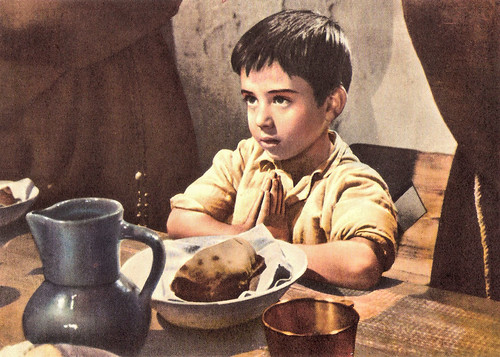
Italian postcard by Ed. Villaggio del Fanciullo, Bologna. Photo: E.N.I.C. Publicity still for Marcelino, pan y vino/The Miracle of Marcelino (1955).
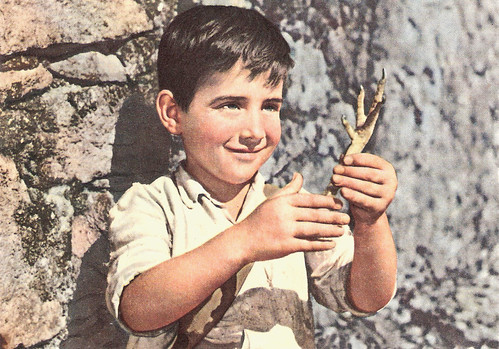
Italian postcard by Ed. Villaggio del Fanciullo, Bologna. Photo: E.N.I.C. Publicity still for Marcelino, pan y vino/The Miracle of Marcelino (1955).
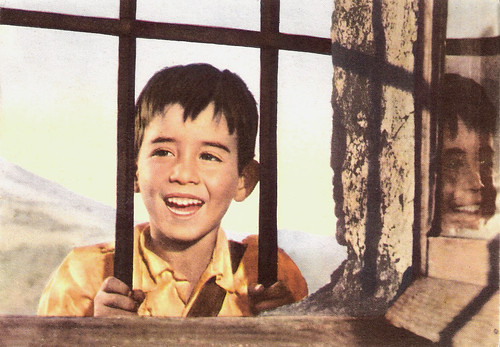
Italian postcard by Ed. Villaggio del Fanciullo, Bologna. Photo: E.N.I.C. Publicity still for Marcelino, pan y vino/The Miracle of Marcelino (1955).
Pablito Calvo was 8 years old when he played the lead role in Marcelino, pan y vino (1955), literally Marcelino, bread and wine.
The Spanish film was written by José María Sánchez Silva, who based it on his novel, and directed by Ladislao Vajda. The story, revised and modernised in both the book and film, dates back to a medieval legend, one of many gathered together in a volume by Alfonso el Sabio. Cinematographer Heinrich Gartner was responsible for the beautiful black-and-white photography.
Pablito plays Marcelino, an orphan abandoned as a baby on the doorstep of a monastery in nineteenth-century Spain. The monks raise the child, and Marcelino grows into a a mischievous young sprout. Yearning for friends his own age, the boy inadvertently causes all sorts of havoc. One day when he eats his small meal in a room full of old things, he gives a piece of his bread to an old wooden Jesus figure - and indeed it takes the bread and eats it. Getting a wish granted for his donation Marcelino wishes to see his mother...
At the 1955 Cannes Film Festival the film won an award, and at the 5th Berlin International Film Festival it won the Silver Bear. Pablito, who had received a special mention from the Cannes festival jury, became Spain's most famous child actor. The film became one of the first Spanish films to become successful in the USA.
The following year Pablito appeared in Mi tío Jacinto/Pepote (Ladislao Vajda, 1956) which won the Golden Bear (Audience Award) at the Berlin International Film Festival. After some more films, he retired from acting in 1963. He was 16 and had decided to become an industrial engineer.
Marcelino, pan y vino (1955) remains one of the most famous and successful Spanish films ever made. There were many remakes, including a Philippine TV version, Marcelino pan y vino (Mario O'Hara, 1979), an Italian remake, Marcellino (Luigi Comencini, 1991), an animated TV series, Marcelino Pan y Vino (2000-2001, 2004), and a Mexican remake, Marcelino Pan y Vino (Jose Luis Gutierrez, 2010), with the basic storyline and framed by the Mexican Revolution of 1910. None of these remakes was as successful as the original.
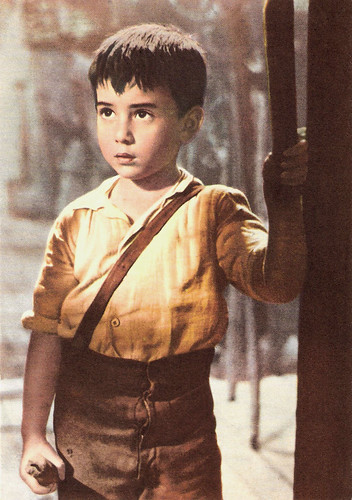
Italian postcard by Ed. Villaggio del Fanciullo, Bologna. Photo: E.N.I.C. Publicity still for Marcelino, pan y vino/The Miracle of Marcelino (1955).
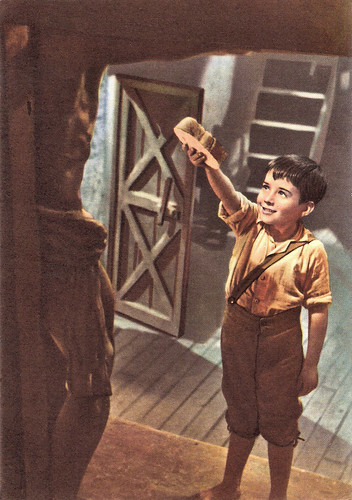
Italian postcard by Ed. Villaggio del Fanciullo, Bologna. Photo: E.N.I.C. Publicity still for Marcelino, pan y vino/The Miracle of Marcelino (1955).
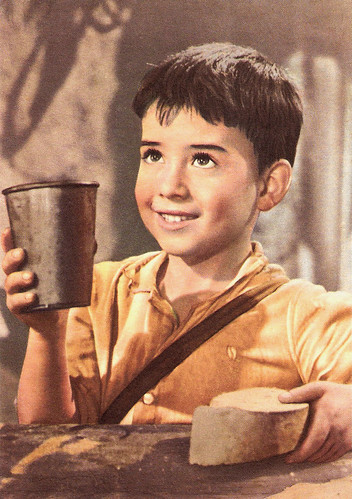
Italian postcard by Ed. Villaggio del Fanciullo, Bologna. Photo: E.N.I.C. Publicity still for Marcelino, pan y vino/The Miracle of Marcelino (1955).
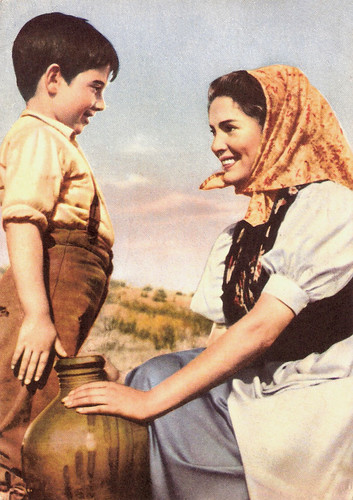
Italian postcard by Ed. Villaggio del Fanciullo, Bologna. Photo: E.N.I.C. Publicity still for Marcelino, pan y vino/The Miracle of Marcelino (1955) with Pablito Calvo and Rosita Valero.
Spanish trailer for Marcelino, pan y vino/The Miracle of Marcelino (1955) with the voice of Fernando Rey. Source: Ce Blacas (YouTube).
Sources: Hal Erickson (AllMovie), Volker Boehm (IMDb), Wikipedia and IMDb.

Italian postcard by Ed. Villaggio del Fanciullo, Bologna. Photo: E.N.I.C. Publicity still for Marcelino, pan y vino/The Miracle of Marcelino (1955).

Italian postcard by Ed. Villaggio del Fanciullo, Bologna. Photo: E.N.I.C. Publicity still for Marcelino, pan y vino/The Miracle of Marcelino (1955).

Italian postcard by Ed. Villaggio del Fanciullo, Bologna. Photo: E.N.I.C. Publicity still for Marcelino, pan y vino/The Miracle of Marcelino (1955).
Orphan in a monastery
Pablito Calvo was 8 years old when he played the lead role in Marcelino, pan y vino (1955), literally Marcelino, bread and wine.
The Spanish film was written by José María Sánchez Silva, who based it on his novel, and directed by Ladislao Vajda. The story, revised and modernised in both the book and film, dates back to a medieval legend, one of many gathered together in a volume by Alfonso el Sabio. Cinematographer Heinrich Gartner was responsible for the beautiful black-and-white photography.
Pablito plays Marcelino, an orphan abandoned as a baby on the doorstep of a monastery in nineteenth-century Spain. The monks raise the child, and Marcelino grows into a a mischievous young sprout. Yearning for friends his own age, the boy inadvertently causes all sorts of havoc. One day when he eats his small meal in a room full of old things, he gives a piece of his bread to an old wooden Jesus figure - and indeed it takes the bread and eats it. Getting a wish granted for his donation Marcelino wishes to see his mother...
At the 1955 Cannes Film Festival the film won an award, and at the 5th Berlin International Film Festival it won the Silver Bear. Pablito, who had received a special mention from the Cannes festival jury, became Spain's most famous child actor. The film became one of the first Spanish films to become successful in the USA.
The following year Pablito appeared in Mi tío Jacinto/Pepote (Ladislao Vajda, 1956) which won the Golden Bear (Audience Award) at the Berlin International Film Festival. After some more films, he retired from acting in 1963. He was 16 and had decided to become an industrial engineer.
Marcelino, pan y vino (1955) remains one of the most famous and successful Spanish films ever made. There were many remakes, including a Philippine TV version, Marcelino pan y vino (Mario O'Hara, 1979), an Italian remake, Marcellino (Luigi Comencini, 1991), an animated TV series, Marcelino Pan y Vino (2000-2001, 2004), and a Mexican remake, Marcelino Pan y Vino (Jose Luis Gutierrez, 2010), with the basic storyline and framed by the Mexican Revolution of 1910. None of these remakes was as successful as the original.

Italian postcard by Ed. Villaggio del Fanciullo, Bologna. Photo: E.N.I.C. Publicity still for Marcelino, pan y vino/The Miracle of Marcelino (1955).

Italian postcard by Ed. Villaggio del Fanciullo, Bologna. Photo: E.N.I.C. Publicity still for Marcelino, pan y vino/The Miracle of Marcelino (1955).

Italian postcard by Ed. Villaggio del Fanciullo, Bologna. Photo: E.N.I.C. Publicity still for Marcelino, pan y vino/The Miracle of Marcelino (1955).

Italian postcard by Ed. Villaggio del Fanciullo, Bologna. Photo: E.N.I.C. Publicity still for Marcelino, pan y vino/The Miracle of Marcelino (1955) with Pablito Calvo and Rosita Valero.
Spanish trailer for Marcelino, pan y vino/The Miracle of Marcelino (1955) with the voice of Fernando Rey. Source: Ce Blacas (YouTube).
Sources: Hal Erickson (AllMovie), Volker Boehm (IMDb), Wikipedia and IMDb.
No comments:
Post a Comment